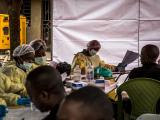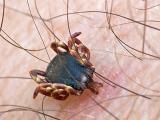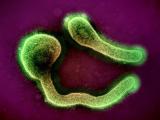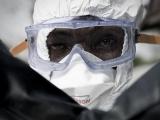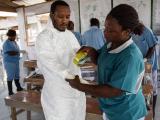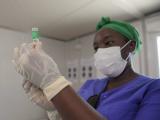Aug 7, 2003 (CIDRAP News) – Researchers from the National Institute of Allergy and Infectious Diseases (NIAID) have determined that a single injection of a fast-acting experimental Ebola vaccine confers protection against the disease in monkeys after just 1 month. If the vaccine is found to act similarly in humans, it could be used for ring vaccination to quickly contain Ebola outbreaks, plus there may be important implications for protection against a variety of other pathogens in the future.
Findings of the research, which involved collaboration of scientists from NIAID and the United States Army Medical Research Institute of Infectious Diseases (USAMRIID), was published in today's issue of Nature. The authors have been testing the "prime-boost" vaccine strategy for a variety of infectious diseases. It normally involves multiple injections over 6 months, the first containing noninfectous genetic material (DNA) from the disease-causing microbe to prime the immune system, and the other(s) involving injection with attenuated carrier viruses containing key genes from the microbe to boost the immune response.
The authors had found previously that the boost injection alone produces a quicker but weaker immune response than the prime-boost method. They explain that the adenoviral (ADV) boost expands the primary T-cell response induced by the DNA vaccinations. "When animals are primed with ADV vectors alone, a robust Ebola-virus-specific cellular and humoral immune response is more rapidly achieved," they continue.
In the current research, the authors tested whether a single boost injection would be enough to protect against a lethal dose of disease. They immunized eight cynomolgus macaques with ADV vector encoding Ebola virus proteins and then challenged the animals 28 days later with either low- or high-dose Ebola virus. All animals were completely protected, as determined by generation of Ebola-specific CD8+ T-cell and antibody responses.
Ebola is a highly lethal virus that spreads easily from person to person, causes illness quickly, and kills a significant number of the people it infects, according to an NIH press release about the research issued yesterday. No treatment is available, so preventing spread is the only way to contain outbreaks.
"This research has enormous public health implications not only because it might be used to limit the spread of Ebola virus, which continues to emerge in central Africa, but also because this vaccine strategy may be applied to other highly lethal viruses, such as the Marburg and Lassa fever viruses and the SARS coronavirus, that cause acute disease outbreaks and require a rapid response," says NIAID Director Anthony Fauci in the release.
The study authors point out that while the single adenoviral vaccine injection may be best for use in acute outbreaks, the full prime-boost strategy may remain useful in, for example, hospital workers with multiple exposures because of the increased immunologic potency.
Sullivan NJ, Geisbert TW, Giesbert JB, et al. Accelerated vaccination for Ebola virus haemorrhagic fever in non-human primates. (Letter) Nature 2003 Aug 7;424:681-4
See also:
NIH News release, Aug 6, 2003
http://www.nih.gov/news/pr/aug2003/niaid-06.htm
